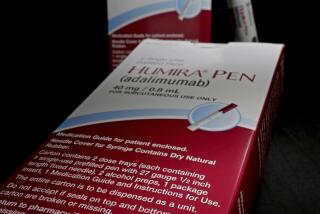Drugs hailed as a ‘major breakthrough’ in treating deadly skin cancer
Two new drugs can significantly increase survival in patients with metastatic melanoma, the advanced and generally lethal form of skin cancer, researchers reported.
Results were so dramatic in a trial of one of the drugs that the study was halted early, researchers reported Sunday at a Chicago meeting of the American Society of Clinical Oncology. Studies on both drugs were published online by the New England Journal of Medicine.
Melanoma is among the most common cancers in the United States. An estimated 68,000 new cases are diagnosed each year, with 8,700 deaths.
The shortened trial is notable because the experimental agent called PLX4032, or vemurafenib, is the first chemotherapy agent directed at a specific mutation involved in the formation of skin tumors.
The drug’s development “is a major defining moment that will have an important effect on survival and quality of life,” wrote Dr. Marc S. Ernstoff of the Dartmouth Medical School in Lebanon, N.H., in an editorial accompanying the report. But the mutation that the drug targets occurs in only 47% of melanoma patients, and the drug appears to help only about half of them.
Many of the rest may benefit from the second drug, called ipilimumab and marketed as Yervoy, which stimulates the immune system to fight the tumors. Yervoy was approved by the Food and Drug Administration in March based on earlier results that showed it was more effective than a vaccine used to treat melanoma. The findings reported Sunday showed that it also was better than conventional chemotherapy.
The manufacturers of the two new drugs funded the studies and are planning trials to use the agents together to see if the combination can further improve outcomes.
The findings are “absolutely a major breakthrough for patients who have metastatic … melanoma” or inoperable melanoma, said Dr. Sylvia Adams, a melanoma immunotherapy expert at the New York University School of Medicine and a spokeswoman for the American Society of Clinical Oncology. She was not involved in the studies.
The incidence of melanoma is increasing most rapidly among the elderly and among women ages 15 to 39, presumably because of excess exposure to ultraviolet radiation outdoors and in tanning salons.
The conventional treatment is with the drug dacarbazine, which produces a median survival of 5.6 to 7.8 months after treatment commences.
Vemurafenib targets the V600E mutation in a gene called BRAF, which is involved in cell growth. Small, early studies suggested the drug could be quite powerful.
In the new trial, a team headed by Dr. Paul Chapman of the Memorial Sloan-Kettering Cancer Center in New York enrolled 675 patients with the V600E mutation at 103 sites around the world. Half of the patients took dacarbazine, and half took vemurafenib.
After three months, those receiving vemurafenib had a 74% reduction in progression of the disease and a 63% reduction in the risk of death. About 48% of the patients’ tumors showed a response to the drug, compared with only a 5.5% response in those taking dacarbazine.
The results were so powerful that the study’s data-monitoring committee recommended halting the study and giving vemurafenib to all the patients.
Primary side effects were skin rashes, sensitivity to light and joint pain.
In the second study, a team led by Dr. Jedd Wolchok, also of Memorial Sloan-Kettering, enrolled 502 patients with metastatic melanoma who had never been treated. Half received Yervoy plus dacarbazine, and half received dacarbazine and a placebo.
After one year, 47.3% of patients who received the combination were still alive, compared with 36.3% of those receiving only dacarbazine. At two years, the figures were 28.5% for Yervoy and 17.9% in the control group, and after three years, 20.8% and 12.2%. The median survival for those taking Yervoy and dacarbazine was 11.2 months, compared with 9.1 months among those given only dacarbazine.
Side effects included elevated liver enzymes, diarrhea and rash.
The chief drawback of the drugs is cost. Yervoy, manufactured by Bristol-Myers Squibb, costs $120,000 for a course of treatment. Roche and Plexxikon Inc., a biotechnology company in Berkeley that developed vemurafenib, are expected to apply to the FDA shortly for approval to market the drug but have not yet announced a price.
More to Read
Sign up for Essential California
The most important California stories and recommendations in your inbox every morning.
You may occasionally receive promotional content from the Los Angeles Times.





